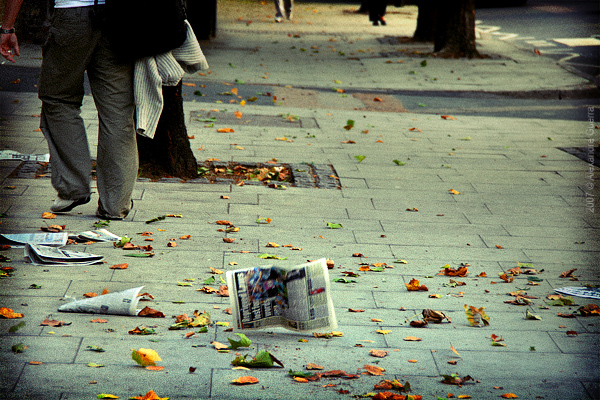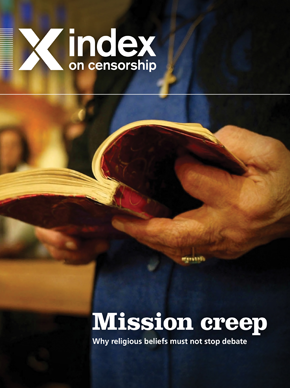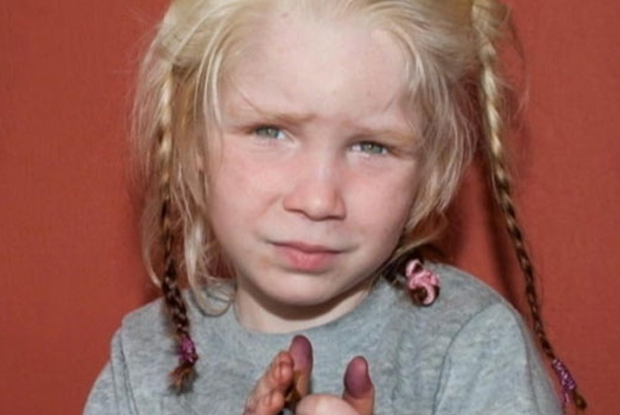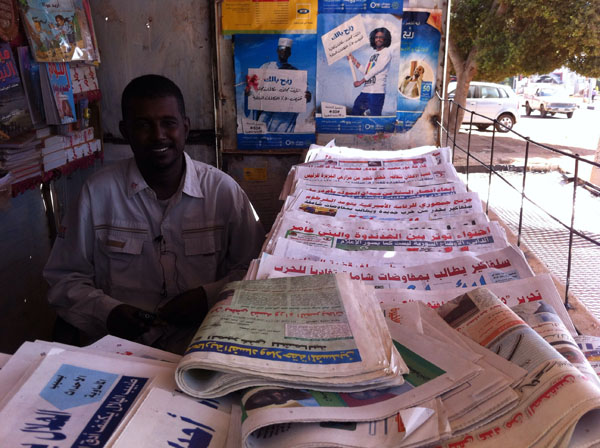6 Feb 2014 | Events, Media Freedom, Uncategorized

Join Index on Censorship for a lively discussion of the past and future of Britain’s free press.
2014 is set to be a pivotal year for UK media. The new defamation law will see its first tests, and the press and campaigners are rushing to establish a new regulator. Is the free press under threat? How much of a difference will new libel laws matter? Is the debate already out of date?
With Gill Phillips (Legal Director, Guardian Media Group), Gavin Millar QC (Doughty Street Chambers), Jonathan Heawood (Director of the Impress Project), Tom Phillips (Senior Writer, Buzzfeed UK), Padraig Reidy (Index on Censorship, Chair).
WHEN: Wednesday 19th February 2014, 18:30 – 20:00 inc. drinks
WHERE: Doughty St Chambers, 53-54 Doughty St, WC1N 2LS
TICKETS: RSVP here
@IndexEvents – #lifeafterleveson
Generously supported by

9 Dec 2013 | Volume 42.04 Winter 2013
 The upcoming winter issue of Index on Censorship magazine includes a special report on religion and tolerance, with articles from around the world.
The upcoming winter issue of Index on Censorship magazine includes a special report on religion and tolerance, with articles from around the world.
Writers include the Bishop of Bradford, Salil Tripathi, Samira Ahmed and Kaya Genc. There’s an interview with Gurpreet Kaur Bhatti ahead of the opening of her new play, and 10 years after Behzti; while cartoonist Martin Rowson writes and draws about how comedy and religious offence come into conflict. Natasha Joseph writes from South Africa on why some portraits of President Zuma made him see red. Alexander Verkhovsky discusses the new blasphemy law in Russia, and former BBC mobile editor Jason DaPonte discusses why computer games are not all bad.
As part of the special report, writer Brian Pellot goes online with the Mormons to see how they use technology to talk to the unconverted, and asks if online chats will replace missions. Germans have been outraged by the revelations about US and UK surveillance, now they have plans to do something different to put a stop to snooping in the future, Sally Gimson reports. From Brazil, Ronaldo Pelli looks at the reaction to people practising religions of African origin, and investigative writer and author of Fast Food Nation Eric Schlosser talks about the threats to investigative journalism now and in the future.
Also in this issue:
Padraig Reidy on flags, controversy and Northern Ireland
Xiao Shu on the Chinese crackdown on the New Citizens’ Movement
Kaya Genc on the rise of a new type of media in Turkey
6 Nov 2013 | Greece, News, Politics and Society, Religion and Culture

The case of a little girl called Maria, allegedly abducted by a Roma couple on the outskirts of Farsala in central Greece, has filled local and world headlines with prejudice and racist stereotypes.
Maria’s appearance -a blonde girl with blue eyes- was enough to spark speculation in tabloid press about Roma involvement in child abductions and other serious offenses. “Roma grab babies” screamed a headline in a newspaper. Mainstream media’s sensationalism favoured the ancient notion of the “evil gypsies.”
However, no media outlet that carried sensationalised reports were eager to admit their abusive language when Maria’s parents proved to be Roma from Bulgaria. Maria’s adoptive parents in Greece had told the truth about the girl’s origins. Only it was too late to correct the demonization of an already excluded group.
Lina Giannarou, a reporter of the newspaper Kathimerini offered her insight into the coverage of the story:
“I think the main problem was that the media merely followed the police investigation. There was no first-hand reporting on what really happened with the little girl nor serious analysis on the major side issues that this tragic story revealed, like for example the thousands of illegal adoptions taking place all over the country. The vast majority of articles focused on the suspected crime and the supposed abduction. When it became clear this was not the case, the story ceased to be of interest.”
Smile of the Child, the charity entrusted with Maria’s care, compounded the misinformation.
On 1 October, Damian Mac Con Uladh, a journalist with online news service “EnetEnglish”, published a revealing story about the contradictory comments and the false assessments made by the charity’s director and other representatives.
The case was communicated with language targeting the Roma couple, while maintaining a climate of moral panic towards them. At times, representatives of the charity appeared to be sure of her origin (“the girl was not a Roma”), while mixing every possibility of her being abducted, being sold or mistreated. According to their claims, the girl had been treated as “a dancing bear” or like “a commodity.”
All the panic produced was to be answered by police operations carried out against Roma communities. This summer already, riot police squads had conducted large operations throughout the country, in the southern Peloponnese and in Thiva settlements in central Greece.
However, Dimitris Angelidis, reporter of the Editor’s Newspaper suggests that the linking of Roma with criminality is a false one.
“Roma people, together with immigrants, street drug users, people living on the street and other marginalized groups of people, have been the target of regular police operations. These operations, which have been condemned by European authorities for their extreme use of ethnic profiling, do little more than painting a negative picture that connects inescapably Roma to criminality. The few news items about Roma emphasize their supposed criminal behavior which is not supported by police statistics: raids in Roma settlements are very often but they result in very few arrests, a mere 3 percent.”
Panayote Dimitras, Spokesperson of Greek Helsinki Monitor and Humanist Union of Greece explained the wider context.
“The living conditions of Roma in Greece and Italy are at their worst level right now. And while there is much attention to Italy, no one focuses in Greece whereby Roma experience their worst year in a 15 years period. Hundreds of millions of euro aimed at their social inclusion and their living conditions have changed little. Most of their settlements remain unsafe while the children do not go to school or attend Roma-only schools.”
Poorly educated, disconnected from the world
The low level of education among Roma puts them at a constant social disadvantage. Although Greece has been found violating the European Convention for Human Rights, for the segregation of Roma children in separate schools, the contempt coming from non Roma parents and the pressure from state and local authorities pose serious restrictions.
Alexis Koutrouvelis has been teaching in a Roma-only school for the past 4 years, in Aspropirgos, a suburb of Athens in the West Attica region. Koutrouvelis described the way Roma children go to school.
“Roma communities are largely uneducated, thus, parents do not understand the necessity of education. Following this culture, children cannot easily perceive a space-time continuum, they don’ t seem to hold a strong sense of identity throughout history.”
Being at the bottom of the social class pyramid, Roma children grow up without knowing their rights. In addition, most of their contact with the government is when police conducts raids against their communities.
“There are children that never really leave the settlements. Some of them do not even know what lies behind the mountain of Egaleo. They grow up learning to pay for someone else’s bad deeds in their community,” Koutrouvelis said.
Poor education does not mean these kids are deprived of imagination. In 2011, director Yorgos Didimiotis made a short film with Roma children in Aspropirgos. The narrative and the themes were the childrens’ work, Didimiotis did only the technical staff and gave them basic tips.
He said that it was an unprecedented experience.
“I’ve never seen so much enthusiasm in children. You could see the need for expression with an unstoppable imagination. These children were so proud to be making a short-film when at the end, it was difficult to stop them from watching it, over the 25th time! And imagine that some of them have never been to the cinema.”
This article was originally published on 6 Nov 2013 at indexoncensorship.org
3 Sep 2013 | Middle East and North Africa, News, Sudan

Photo: Usamah Mohammed
Three Sudanese columnists were prevented from writing by the National intelligence Security Services (NISS) after they condemned the Muslim Brotherhood in Egypt. Journalists Salah Awooda, Zuhair Elsrag and Rishan Oshi were banned from writing for between five to fifteen days during August after criticizing the Islamist group. This is part of a growing trend in Sudan for opinion columnists to be targeted by Government censorship, rather than newspapers.
Awooda, who works for the pro-government newspaper Alkir Lahza, was removed from his desk after he suggested that the Sudanese government’s criticism of the Egyptian military was hypocritical, as they also came to power via a military coup.
“They have suspended me because I condemned their contradictions about Egyptian events and claimed that they have acted as if they are democratic people,” Awooda says.
He also pointed out that the Sudanese government and its allied Islamists groups have organised demonstrations in front of the Egyptian embassy in Khartoum protesting against military action against the Brotherhood. Moreover, the official Sudanese media and others aligned with the Government have waged a campaign against the military intervening in politics in Egypt.
“I’m just surprised how they talk about legitimacy and democracy in Egypt,” he added, “while they undertook a military coup against the democratically elected government in Sudan in 1989 and they didn’t apologise to the Sudanese people for what they did. This is double standards”.
Awooda has been suspended on three occasions over the last two months, without any legal basis, following telephone calls by NISS agents to his editor-in-chief. The columnist was barred from writing for a month, and then for a further two days, after he criticized Government censorship. He was then detained for 15 more days without any apparent cause. In 2010, Awooda’s appointment as editor-in-chief of independent daily newspaper Aljareeda was blocked despite his considerable experience as editor-in-chief of three newspapers.
“They have stopped me three times since last July without giving any official reasons” he says. “They just suspend writers according to their mood without any legal basis in NISS regulations or the current constitution.”
Sudanese journalists have been engaged in a long running battle with the government over press freedom. 15 independent and anti-government newspapers have been closed in recent years. Since 2011, about 15 columnists have been prevented from working by NISS, though some have been allowed to return to their jobs after being suspended. Five have gone on to write for web publications but now the government is preparing a new law on electronic media which may lead to further harassment. In September 2009 the Sudanese Constitutional Court in Sudan rejected an appeal brought by a group of journalists, writers and columnists against newspaper censorship by NISS.
In a report on freedom of speech published in May by the organisation Journalists for Human Rights (JHR), the Sudanese government is accused of continuing to restrain press freedoms. It noted that the Sudanese government, via the NISS, has started to put pressure on individual columnists leading to their suspension, rather than targeting newspapers as they used to.
“There are many reasons for this,” says Faisal Mohamed Salih, a Khartoum columnist and winner of the Peter Mackler Award for ethical journalism. “For a long time the NISS restrained the news and other types of journalism as they controlled the newspapers but they moved their attention to the columnists because they have become stars. Readers prefer to get their information in opinion columns instead of the news stories.
“The NISS has succeeded in controlling newspapers but they couldn’t do it with the columnists because they are not employees of the newspapers, unlike the journalists, and can publish information that journalists couldn’t do” Faisal adds.
Yassin Hassan Bashir, another columnist who has been stopped from writing, thinks that the columns are an easier target for NISS censors compared to essays and investigative stories, simply as they are quicker to read.
“Because they are shorter than other type of journalism,” Bashir says, “they can read them more easily. You sometimes find the same opinions in longer, more difficult investigative stories, but they ignore it. They are not aware enough to evaluate the longer or more complex articles or they are too lazy to read them all”.
Aldooma argues that while government censors still target newspapers, they do so less than in the past. As the nature of journalism in Sudan changes to more opinion journalism than news and investigative journalism columnists will be increasingly targeted.



 The upcoming winter issue of Index on Censorship magazine includes a special report on religion and tolerance, with articles from around the world.
The upcoming winter issue of Index on Censorship magazine includes a special report on religion and tolerance, with articles from around the world.
